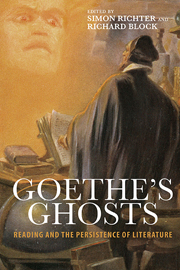Book contents
- Frontmatter
- Contents
- Introduction—Ghosts and the Machine: Reading with Jane Brown
- Part I The Ghosts of Goethe's Past
- Part II The Ghost That Keeps on Giving
- Part III Spirited Encounters
- 11 The Imagination of Freedom: Goethe and Hegel as Contemporaries
- 12 Effacement vs. Exposure of the Poetic Act: Philosophy and Literature as Producers of “History” (Hegel vs. Goethe)
- 13 Toward an Environmental Aesthetics: Depicting Nature in the Age of Goethe
- 14 “Ein heimlich Ding”: The Self as Object in Annette von Droste-Hülshoff
- 15 “Ja, Goethe über alles und immer!”: Benn's “Double Life” in His Letters to F. W. Oelze (1932–56)
- Bibliography of Jane K. Brown's Publications
- Notes on the Contributors
- Index
11 - The Imagination of Freedom: Goethe and Hegel as Contemporaries
from Part III - Spirited Encounters
Published online by Cambridge University Press: 05 March 2014
- Frontmatter
- Contents
- Introduction—Ghosts and the Machine: Reading with Jane Brown
- Part I The Ghosts of Goethe's Past
- Part II The Ghost That Keeps on Giving
- Part III Spirited Encounters
- 11 The Imagination of Freedom: Goethe and Hegel as Contemporaries
- 12 Effacement vs. Exposure of the Poetic Act: Philosophy and Literature as Producers of “History” (Hegel vs. Goethe)
- 13 Toward an Environmental Aesthetics: Depicting Nature in the Age of Goethe
- 14 “Ein heimlich Ding”: The Self as Object in Annette von Droste-Hülshoff
- 15 “Ja, Goethe über alles und immer!”: Benn's “Double Life” in His Letters to F. W. Oelze (1932–56)
- Bibliography of Jane K. Brown's Publications
- Notes on the Contributors
- Index
Summary
Areader of Hegel's letter to Goethe of 24 April 1825 encounters this (to my mind, deeply moving) expression of indebtedness: “When I survey my intellectual development, I find you everywhere interwoven therein and might well call myself one of your sons; from you my inner life acquired nourishment and the strength to resist abstraction and found its just course by keeping your constructs [Gebilden] in sight as if they were beacons.” Needless to say, the passage has not gone unnoticed and the relationship between Goethe and Hegel has often been treated in the scholarship, most recently in the important book by Eckart Forster, Die 25 Jahre der Philosophie Typically it was the scientist Goethe who came into focus in such studies, or the author of “maxims and reflections.” Where literary works by Goethe were taken into consideration, the usual procedure was to extract from them a few pithy apothegms that in their inscrutability looked vaguely philosophical. In this paper, I too want to explore affinities between Hegel's thought and Goethe's writing, but I wish to come at the matter from a slightly different angle than that common in the research. For it has always seemed to me that the sentences from Hegel's letter suggest intensity of engagement with the literary construct itself, attentiveness focused on the structure and texture of literary works.
- Type
- Chapter
- Information
- Goethe's GhostsReading and the Persistence of Literature, pp. 217 - 238Publisher: Boydell & BrewerPrint publication year: 2013



